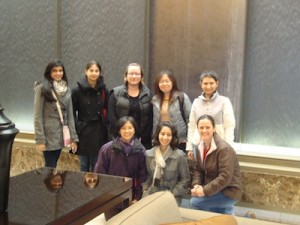By Elnaz Moshfeghian
SGA President
Computer Science Undergraduate

IIT Students Attend 2011 Grace Hopper Celebration of Women in Computing - Back left to right: Aditi Kumar, Manali Sharma, Patrycja Mala, Miao Song, Polina Georgieva - Front left to right: Vida Winans, Elnaz Moshfeghian, Maria Ramirez Loaiza - Not pictured: Alana Platt, Harmony Clauer, Shangping Ren, Cindy Hood
In early November, I, along with four other undergraduate computer science students and five graduate students, set out for the 2011 Grace Hopper Celebration of Women in Computing Conference in Portland, Oregon. Accompanied by Professors Hood, Ren and Winans, and sponsored by the College of Science and Letters, I was amazed by how we went from being in the extreme minority of our classrooms to being surrounded by an unthinkable number of technical women, all under one roof. I for one am guilty of buying into the stereotype and assuming that most of the women I would meet would be shy or antisocial but I was pleasantly surprised if not shocked by the diversity and vibrancy all throughout the conference venue.
The conference is named for Rear Admiral Grace Hopper, a visionary and one of the most iconic women in the field of computing. She popularized the term “computer bug” when she found a moth that was causing a glitch in her computer and said she was “debugging.” A Navy destroyer and a supercomputer were named after her for all of her achievements. The Grace Hopper Celebration of Women in Computing Conference aims to highlight the research and career interests of women in computing. But it’s about more than just the technical side of the field. As Miao Song–one of IIT’s graduate students on the trip–put it, “The Grace Hopper conference is not a technical-oriented conference; instead, it is a life-oriented conference.”
But why the emphasis on women? Careers in technology have been unaffected by the recession and have grown in numbers. Yet computer science is the only technical field whose predicted job demand significantly outstrips the projected number of graduates. However, women represent a mere 13% of computer science graduates in the United States. The argument is that if half the population continues to produce only a small fraction of the technical candidates, we will never be able to fill all the tech positions needed to fuel innovation around the world.
Unanimously, the keynote talk was the favorite part of the conference for us and it addressed this gender divide head-on. Professor Ren said it was “one of the best [she has] ever heard!” The keynote speaker was Sheryl Sandberg, who is currently the Chief Operating Officer at Facebook and previously worked at Google and in the Clinton Administration. Sandberg expressed how the gender divide is not isolated the tech industry because “in the last election, women lost seats in Congress for the very first time.”
To illustrate the need for equal representation of men and women in the workplace, Sandberg quoted Warren Buffett, who attributed his success to the fact that he “was privileged to work during a period when it was only necessary to compete against half of the population.” Sandberg argues that we as a people cannot achieve our full potential without half of the voices present in the most important conversations. Sandberg also highlighted the progress being made by citing how in just five years, Harvey Mudd College was able to increase the percentage of women in their computer science program from 12% to over 40%.
There is more to the picture than numbers and statistics. Building and strengthening a professional community of technical women is key to closing the gender gap. The Grace Hopper Conference provided plenty of opportunities for us to network as well as strengthen our own community of computer science women at IIT. Undergraduate Harmony Clauer reported that she “was able to attend a dinner with the company that [she] interned with over the summer (USAA) and was able to share [her] experience with a group of prospective interns.” Professor Winans “was able to meet another faculty who also runs an after-school program; she was willing to share her curriculum with [Professor Winans].”
Even though we were at the conference for less than two days, it was a welcome break from the routine and an outstanding opportunity to step back and think critically about what it means to be a technical woman.
